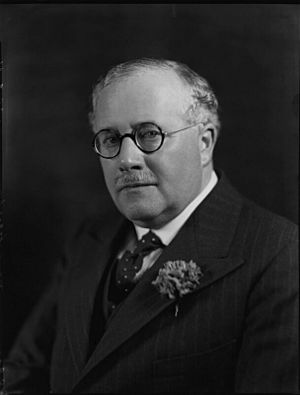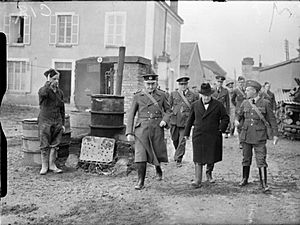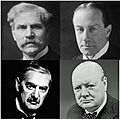Kingsley Wood facts for kids
Quick facts for kids
Sir Kingsley Wood
|
|
|---|---|
 |
|
| Chancellor of the Exchequer | |
| In office 12 May 1940 – 21 September 1943 |
|
| Prime Minister | Winston Churchill |
| Preceded by | Sir John Simon |
| Succeeded by | Sir John Anderson |
| Lord Privy Seal | |
| In office 3 April 1940 – 12 May 1940 |
|
| Prime Minister | Neville Chamberlain |
| Preceded by | Samuel Hoare |
| Succeeded by | Clement Attlee |
| Secretary of State for Air | |
| In office 16 May 1938 – 3 April 1940 |
|
| Prime Minister | Neville Chamberlain |
| Preceded by | Philip Cunliffe-Lister |
| Succeeded by | Sir Samuel Hoare |
| Minister of Health | |
| In office 7 June 1935 – 16 May 1938 |
|
| Prime Minister | Stanley Baldwin Neville Chamberlain |
| Preceded by | Hilton Young |
| Succeeded by | Walter Elliot |
| Postmaster General | |
| In office 25 August 1931 – 7 June 1935 |
|
| Prime Minister | Ramsay MacDonald Stanley Baldwin |
| Preceded by | William Ormsby-Gore |
| Succeeded by | George Tryon |
| Member of Parliament for Woolwich West |
|
| In office 14 December 1918 – 21 September 1943 |
|
| Preceded by | Office Created |
| Succeeded by | Francis Beech |
| Personal details | |
| Born |
Howard Kingsley Wood
19 August 1881 Kingston-Upon-Hull, England |
| Died | 21 September 1943 (aged 62) London, England |
| Political party | Conservative |
| Spouse |
Agnes Lilian
(m. 1905) |
| Children | 1 daughter |
Sir Howard Kingsley Wood (born August 19, 1881 – died September 21, 1943) was an important British politician. He was a member of the Conservative Party.
Kingsley Wood started his career as a lawyer, specializing in a type of insurance called industrial insurance. He then became a member of the London County Council, which governed London. Later, he was elected as a Member of Parliament (MP).
He held many significant government jobs. He worked closely with Neville Chamberlain at the Ministry of Health. He became Postmaster General, where he made the British Post Office much more modern and efficient. Before World War II, as Secretary of State for Air, he greatly increased Britain's production of warplanes.
When Winston Churchill became Prime Minister in 1940, Kingsley Wood was made Chancellor of the Exchequer. In this role, he changed how the government managed the economy. One of his last big ideas was creating "Pay As You Earn" (PAYE) tax. This system, where tax is taken directly from your pay, is still used in Britain today. He sadly passed away on the very day this new system was to be announced.
Contents
Early Life and Career Beginnings
Kingsley Wood was born in Hull, England. He was the oldest of three children. His father, Arthur Wood, was a minister in the Wesleyan Methodist Church. Kingsley grew up in London and went to Central Foundation Boys' School.
He trained to be a solicitor (a type of lawyer) and qualified in 1903. In 1905, he married Agnes Lilian Fawcett. They adopted a daughter. Kingsley Wood started his own law firm in London. He became an expert in industrial insurance law. He helped insurance companies when the government introduced the National Insurance Bill in 1911.
In 1911, Kingsley Wood was first elected to the London County Council (LCC). He represented the Borough of Woolwich. He became very important in the insurance field. He chaired several committees related to insurance, pensions, and housing. In 1918, he was made a knight at the young age of 36 for his work in insurance.
Becoming a Member of Parliament
Kingsley Wood was elected to Parliament as a Conservative MP in 1918. He represented the area of Woolwich West for the rest of his life. Before becoming an MP, he had suggested creating a Ministry of Health. After being elected, he became an assistant to the first Minister of Health.
After the government changed in 1922, Kingsley Wood did not get a new job right away. As a regular MP, he successfully introduced a law called the Summer Time Bill in 1924. This law created the yearly summer time period, which is still in place today.
When Stanley Baldwin became Prime Minister in 1924, Kingsley Wood was appointed as a junior minister at the Ministry of Health. He worked under Neville Chamberlain. They became close friends and political partners. They worked together on improving local government and changing how local taxes were collected. In 1928, he was made a privy councillor, which is a special honor.
In 1931, when the National Government was formed, Kingsley Wood became a junior minister at the Board of Education. After the election in November 1931, he was promoted to Postmaster General. In 1933, he became a member of the Cabinet, which is the group of the most important government ministers.
Important Government Roles
Modernizing the Post Office
As the minister in charge of the General Post Office (GPO), Kingsley Wood took over an old-fashioned organization. The national telephone system, which the GPO ran, was especially criticized. Kingsley Wood wanted to make the GPO more like a business.
Under his leadership, the GPO introduced new services, like "reply paid" for businesses. They also set up a national teleprinter service. For telephones, they started building new automated exchanges. For mail, they bought many new motor vehicles to speed up deliveries.
Kingsley Wood believed in advertising. He started campaigns for the telephone system, which greatly increased the number of people using phones. He also created the GPO Film Unit, which made popular films and raised the GPO's profile. Most importantly, he changed how the GPO was managed. He also made a new financial deal with the government. Before, all the GPO's extra money went to the government. Now, the GPO could keep some money to invest in its services.
Improving Health and Housing
When Baldwin became Prime Minister in 1935, Kingsley Wood was made Minister of Health. At that time, this ministry dealt with housing as much as health. Under Kingsley Wood, there was a big effort to clear slums and reduce overcrowding in homes.
There was also a noticeable improvement in how many mothers died during childbirth. This was partly due to new antibiotics that fought infections. Also, a full-time midwifery service was created in 1936. The housing boom during the 1930s helped the country recover from the Great Depression.
Preparing for War as Air Minister
In March 1938, Kingsley Wood became Secretary of State for Air. At this time, Britain was making about 80 new warplanes each month. Within two years, under Kingsley Wood, this number jumped to 546 planes a month. By the start of World War II, Britain was producing as many new warplanes as Germany.
During the early part of the war, known as the Phoney War, Kingsley Wood limited the Royal Air Force's activities. They mostly dropped propaganda leaflets instead of bombing. By early 1940, Kingsley Wood was very tired from his hard work. He was moved to a less demanding role, Lord Privy Seal. In this job, he chaired committees that looked at social services, domestic issues, and food policy.
Advising Churchill and Becoming Chancellor
In May 1940, Kingsley Wood told Prime Minister Chamberlain that he should resign after a difficult period for the government. He also advised Winston Churchill to become the next Prime Minister. Both men followed his advice. Churchill became Prime Minister on May 10, 1940. Kingsley Wood was appointed Chancellor of the Exchequer on May 12.
Chancellor of the Exchequer and Final Years
Kingsley Wood became Chancellor of the Exchequer during a very important time in World War II. The Treasury's main jobs were to pay for the war, keep prices stable, and get supplies from other countries.
He was Chancellor for 40 crucial months of the war. He presented four budgets to Parliament. In July 1940, he created a group of economic advisers, including the famous economist John Maynard Keynes. Keynes greatly influenced Kingsley Wood's second budget in April 1941. This budget increased the top income tax rate and made millions more people pay income tax for the first time.
Keynes convinced Kingsley Wood to use government spending to control the whole economy, not just government income and expenses. With the huge increase in government spending for the war, there was a risk of inflation (prices going up too much). Kingsley Wood tried to prevent this by giving money to keep prices low for essential rationed goods. He also put high taxes on non-essential goods.
The last big change he started as Chancellor was the "Pay As You Earn" (PAYE) system. This system means that income tax is taken directly from your current pay, instead of being paid later for past earnings. Kingsley Wood sadly died suddenly at his London home on the morning he was supposed to announce PAYE to Parliament. He was 62 years old.
Kingsley Wood was mentioned in a book called Guilty Men (1940). This book criticized public figures for not preparing Britain enough for war and for trying to avoid conflict with Nazi Germany.
Images for kids
-
Kingsley Wood served as a minister under (top) Ramsay MacDonald, Stanley Baldwin, (bottom) Neville Chamberlain and Winston Churchill
 | Shirley Ann Jackson |
 | Garett Morgan |
 | J. Ernest Wilkins Jr. |
 | Elijah McCoy |



